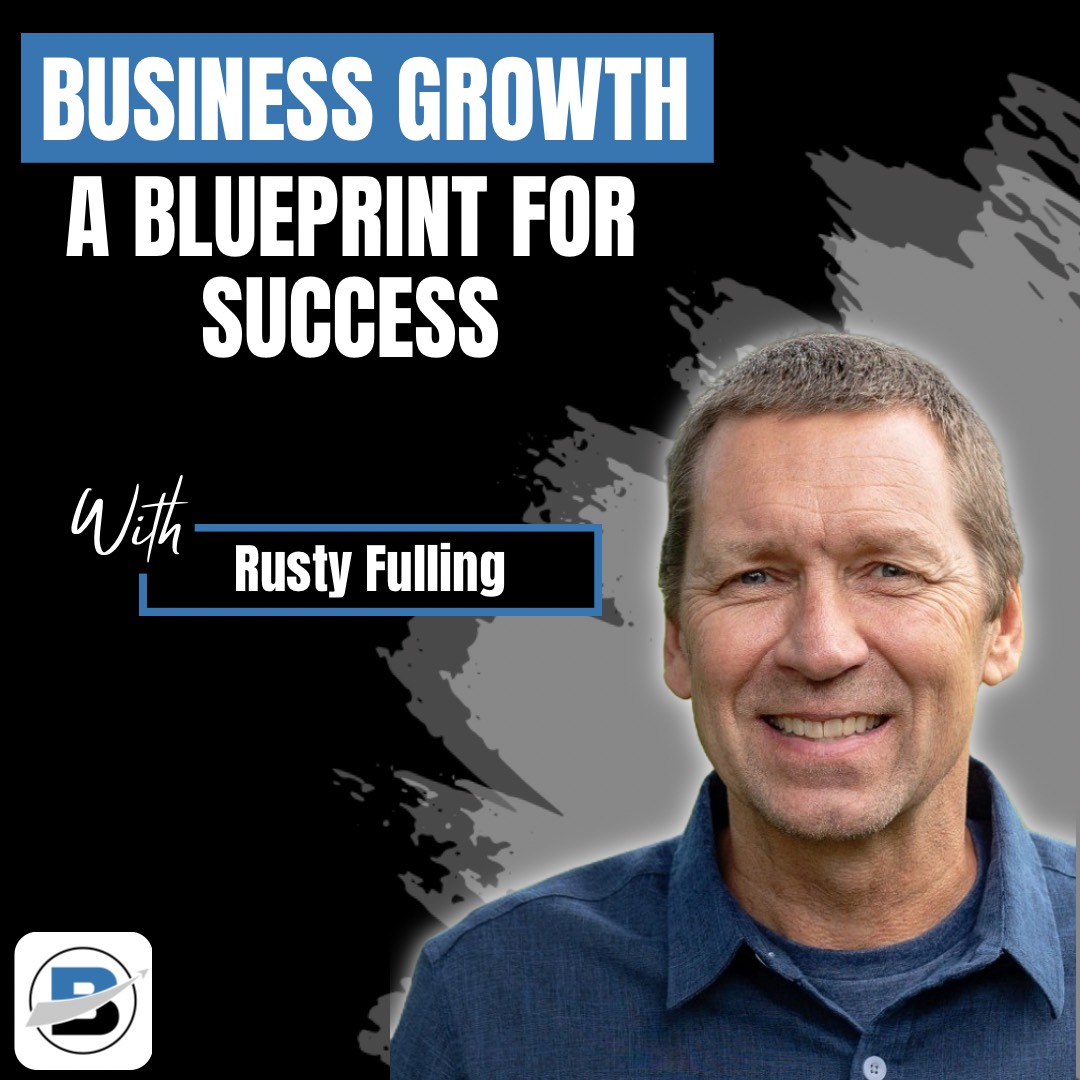Your Business Growth Blueprint
with Rusty Fulling
Introduction
Running a business isn’t easy, especially for young entrepreneurs and small business owners. From keeping up with cash flow to building a team that can help you scale, the demands are endless, and the stakes are high. Rusty Fulling, a seasoned Founder and Advising CEO with Fulling Management, has spent over 25 years helping leaders like you overcome these hurdles. Through his unique approach, Rusty has empowered countless founders to strengthen their business foundations and build a supportive network around them. In this article, we’ll dive into practical advice Rusty offers on tackling cash flow challenges, finding the right mentors, mastering delegation, and more. By the end, you’ll have a roadmap to help you scale sustainably and lead with confidence.
The Triple C Approach for Leaders: Coach, Cheerleader, and Community
Rusty Fulling recommends an approach he calls the “Triple C”: Coach, Cheerleader, and Community. These three roles are essential for leaders who want to build resilience and maintain momentum in their businesses.
Coach
Having a coach or mentor can provide invaluable guidance, especially when it comes to making tough decisions or breaking through mental barriers. A coach helps you see blind spots, learn from someone else’s experience, and develop strategies tailored to your business.
Cheerleader
Entrepreneurs often find themselves on a lonely path, facing pressures that others might not fully understand. A cheerleader—someone who believes in your potential and reminds you of your strengths—can make all the difference. This could be a supportive friend, a family member, or even someone on your team who helps you stay motivated.
Community
Lastly, being part of a community gives you a network of people facing similar challenges. Community is about sharing ideas, learning from others’ mistakes, and getting advice from people who have been in your shoes. Whether it’s a local business network or an online forum, finding your people can bring fresh perspectives and much-needed support.
Together, these three elements create a powerful support system that helps entrepreneurs stay focused and resilient.
Mastering the Art of Delegation
One of the hardest parts of entrepreneurship is letting go. Many business owners feel they need to control every aspect of their business, but this mindset can lead to burnout and slow growth. Rusty Fulling explains that successful leaders learn to delegate effectively, allowing them to focus on their strengths and what drives the business forward.
Why Delegation is so Difficult
For entrepreneurs who have built their businesses from the ground up, it can be tough to trust others with responsibilities. However, Rusty emphasizes that real growth only happens when leaders are willing to let go. Trying to do everything can actually hold your business back.
How to Start
Start by identifying tasks that don’t need your personal touch. These could be routine administrative tasks, day-to-day operations, or even specific projects. Find team members with strengths in these areas and empower them to take ownership. As you delegate, you’ll free up time to focus on high-level strategies and growth opportunities.
Building a Strong Leadership Foundation
At the core of any successful business is a well-defined foundation, something Rusty Fulling stresses to all his clients. Developing clear mission, vision, and values creates a compass that guides your company through growth and change.
1. Mission
Define what your company is set out to achieve. This mission should resonate with everyone on your team and drive your daily actions.
2. Vision
Vision goes beyond mission and encompasses where you want the business to be in the future. It provides a long-term goal that inspires growth and innovation.
3. Values
Establishing core values reinforces a positive company culture. Values help guide decision-making and ensure that your team is aligned with your business’s purpose.
Rusty’s approach highlights how these foundational elements create a cohesive and motivated team, which is essential for sustainable growth.
Modern Tools and Assessments for Business Leaders
Rusty Fulling is a big advocate for using modern tools and assessments to better understand your strengths as a leader. One tool he recommends is Patrick Lencioni’s - The 6 Types of Working Genius, which helps Leaders and Entrepreneurs identify areas of strength and excitement, while reducing internal frustration and burnout.
How Six Working Geniuses Can Help
The assessment breaks down six different “genius areas,” helping leaders identify where they naturally excel and where they struggle. This insight allows business owners to delegate tasks that fall outside their strengths, helping them avoid burnout and focus on what they do best.
Other Recommendations
Michael Gerber’s - The E-Myth Revisited
Michael discusses how business owners can break free from being the sole technician and embrace their role as visionaries and managers. He points out how common assumptions, expectations, and even technical expertise can get in the way of running a successful business.
Craig Groeschel’s - Leadership Podcast
The Craig Groeschel Leadership Podcast brings you empowering insights in about 30 minutes or less. Each episode gives you easy-to-understand takeaways you can use to lead yourself and lead your team.ng insights and guidance.
Find a Mentor
Mentorship can feel like a daunting task, but it doesn’t have to be. Rusty Fulling suggests keeping things simple by looking at the people already around you who inspire you. Mentorship can come from various areas of life—not just business. For example, Rusty mentions that some of his most influential mentors have guided him in areas outside of business, such as family and personal growth.
Here are some practical tips to help you find the right mentor:
Look for Mentorship Programs
Many cities have mentorship programs specifically for entrepreneurs. For instance, in Kansas City, the Helzberg Entrepreneurial Mentoring Program connects young business owners with seasoned entrepreneurs. Programs like these can be a great place to start if you’re looking for structured mentorship.
Ask Directly
If there’s someone you admire and would like to learn from, don’t hesitate to ask. Reach out to them and suggest a coffee meeting to learn about their journey. Be intentional and respectful of their time, and let them know what specific insights you’d like to gain from the mentorship.
Mentorship can offer a unique perspective and guidance to help you avoid common pitfalls and grow faster than you could alone. As Rusty points out, having someone to guide you—even if they’re only a few steps ahead—can make a massive difference in your journey.
Understanding When to Bring in Help
Many young entrepreneurs wait until things are slipping out of control before they consider seeking help. Rusty Fulling highlights the importance of being proactive and recognizing when you might need extra support. In particular, Rusty emphasizes two common signals that indicate a business may need an outside expert like a virtual CFO.
1. Growing Pains and Cash Flow Problems
As a business expands, so does its financial complexity. Small issues that seem manageable early on can quickly spiral into significant cash flow problems if left unchecked. When cash flow becomes unpredictable, and the current accounting team is more reactive than proactive, it may be time to bring in a virtual CFO. Unlike traditional bookkeepers who look at what has already happened, a virtual CFO forecasts future financial trends and provides real-time strategies to address them. Rusty describes this as the difference between using a GPS that actively directs you versus an old map that only shows where you’ve been.
2. Outgrowing Your Team’s Capacity
A second key indicator is when your internal team is struggling to keep up with the demands of your business. This doesn’t mean your team isn’t talented but rather that they may lack the experience to handle the complexities of growth. As Rusty points out, hiring a virtual CFO can provide the “forward-thinking” perspective that a scaling business needs.
By recognizing these signs early, you can take a proactive approach to managing your company’s growth, ensuring that your team and financial strategy are equipped to handle expansion without losing stability.
Recommended Resources for Continued Leadership Growth
To keep growing as a leader, it’s essential to have a constant source of learning and inspiration. Rusty Fulling suggests the following resources:
The Strength of Purpose by Elizabeth Dixon
This book is ideal for entrepreneurs looking to define their purpose and align it with their business mission.
Book Link Here
Path for Growth Podcast with Alex Judd
Alex Judd’s podcast provides actionable advice for entrepreneurs seeking to build a growth-oriented mindset and culture.
Podcast Link Here
Craig Groeschel’s Leadership Podcast
Known for his insights on leadership, Groeschel offers practical advice on everything from team dynamics to personal development.
Podcast Link Here
Each of these resources offers valuable insights that can empower you to keep learning, adapting, and improving as a leader.
Conclusion
Leading a successful business is a journey filled with both challenges and rewards. By taking proactive steps to address cash flow issues, finding mentors and a supportive community, delegating effectively, and building a strong foundation, you’ll be well on your way to creating a sustainable and thriving business.
As Rusty Fulling advises, remember not to go it alone. Build a network around you, stay true to your mission, and lean into your strengths. With the right tools and people, there’s no limit to what you can achieve as an entrepreneur.

